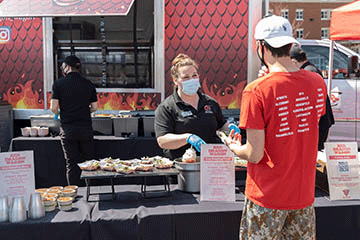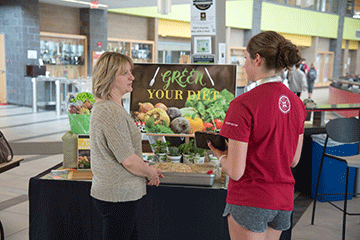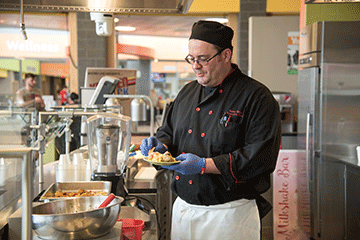SUNY Cortland dining increases food recycling

04/04/2023
To some people, food that goes uneaten is trash.
To Nichole Edwards, the meal leftovers offer a teachable moment, a challenge and an opportunity to help address hunger in the community.
“It sounds a little silly to be proud of your waste, but I’m very proud when I look at all that doesn’t go in the trash and the effort that our staff puts into getting things ready for compost,” said Edwards, the associate executive director of SUNY Cortland Auxiliary Services (CAS), which operates the university’s dining services.
Last year, Cortland Auxiliary took action that kept nearly 63,800 pounds of uneaten food out of Cortland County’s landfill. That’s nearly 29 tons, or roughly equivalent to a stack of New York style pizzas half a mile tall.
It did that by increasing the amount of scrap food waste it composted by a third, from 46,200 to 61,498 pounds.
In addition, it more than tripled its donations of unused food to local pantries by about one-third, from approximately 600 to 2,300 pounds, sending both fresh and nonperishable foodstuffs to local food pantries, including Loaves and Fishes, Cortland YMCA, Cortland YWCA, Seven Valley Food Coalition and the university’s own SUNY Cortland Cupboard for students.
“What goes where depends on who’s going to be able to make the best use of it,” said Edwards, who joined the Cortland Auxiliary Services more than 12 years ago and was appointed to her current role more than two years ago.
“Health code wise, we can donate it as long as it hasn’t been touched by a customer, so as long as it wasn’t actually on the serving line where the customer could have used the tong, because you can’t control cross-contamination at that point,” she said. “We can put it into a meal to-go container for the SUNY Cortland Cupboard, for a student to take home with reheat instructions.”
In January, CAS for a second year revealed the amount of generated waste it handles when turning in required annual reporting for businesses and institutions. The New York State Department of Environmental Conservation (DEC) asked CAS to provide data on how much excess food the campus both composts and donates.

The report gives the campus the means to benchmark its food service sustainability progress.
Cortland Auxiliary is required to donate wholesome excess food to help address hunger regulated under the New York State Food Donation and Food Scraps Recycling Law.
The CAS is exempt from composting unusable food waste, due to the campus being too far away — more than 25 miles — from a state-certified composting company. Yet CAS composts waste food anyway, sending most scraps away with Natural Upcycling and its fryer oil for repurposing with Restaurant Technologies (RTI).
“We continue to review data to minimize any over-production, so the increase reflects that we are capturing more of the foods that would have gone in the landfill rather than showing an increased quantity of total food produced that then was wasted,” Edwards said.
“As much as the number went up this year, our per meal food waste is down most of the time,” Edwards said. “So that tells me we are doing the right things in the individual moment, in terms of just-in-time cooking, not overproducing, reading into what the students are actually asking for as far as food, and producing food that’s going to get eaten rather than just thrown out.”
Years ago, Auxiliary Services had implemented many programs and initiatives that now enable the company to quickly adapt to the relatively recent New York State Department of Environmental Conservation recycling and donation requirement.
Now, Edwards and the dining operation staff use these waste tracking metrics to tailor their food offerings and menus by garnering customer feedback, as well as in staff development.
“‘Lean Path’ has been with us for about 10 years,” she said. “That’s a program we use in residential dining where we can actually weigh the food coming off the line, and the food coming back from students’ plates.”
The metrics also serve as an educational tool.
“We’ll be doing “Weigh the Waste” again for Earth Day,” Edwards said. “We’ll bring our scale out front so students can actually see the volume of the food that they as a customer put back in the system; they can see what it looks like by the hour and how much that looks like in a given day.”

Trays that can be overloaded with food are long gone and plates have shrunk, inspired about a decade ago by the national Partnership for a Healthier America, which recognized SUNY Cortland as one of the healthiest campuses in the United States.
“Not getting your meal all at once gives you that mental time to read your body’s signal as far as whether or not you’re satiated,” she said.
Edwards takes part in meetings of the university’s Sustainability Coalition. She works closely with Auxiliary Services employees including a senior dining manager involved with the SUNY Cortland Cupboard’s Fill the Fridge Fridays program.
“It’s a team effort, I just bring all the pieces together,” she said.
Some of the best ideas were suggested by staff and student workers, for example, biodegradable straws that won’t clog the stomachs of marine animals.
“It’s staff who came to us and said, ‘Hey, can’t we do something better?’ That makes me happy, because if we’re all aware and we’re all looking at it, somebody’s going to come up with a better way to do something.”
Edwards arrived at Cortland with dual bachelor’s degrees, a B.A. in theatre and a B.A. in history with teaching certificate from Otterbein University in Westerville, Ohio, plus middle school teaching experience. Two years ago, she earned a master’s degree in human resources management from Southern New Hampshire University.
“Theatre people are good at being creative and finding solutions to things,” Edwards said. “You’ve just got to make it all fit and make it work because ‘no’ is not an option.”
Her education background is helpful, too.
“They are coming to college and there are greater and different experiences than back home,” she said. “They are just so wonderful when we can work on things that really matter.”

